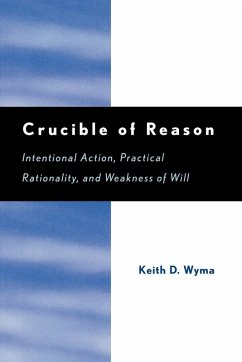In this clear, incisive, and well-written inquiry, philosopher Keith D. Wyma subjects the thought of three prominent intentional theorists, R. M. Hare, Donald Davidson, and Thomas Aquinas, to the crucible of reason to see whether, and how, they can account for weakness of will. Wyma is careful to clarify which actions count as incontinent or the result of weakness of will; they must be performed intentionally even as they are judged as something that ought not to be done. His in-depth study of Hare, Davidson, and Aquinas on this important issue is a major contribution to understanding practical rationality and intentional action.
Hinweis: Dieser Artikel kann nur an eine deutsche Lieferadresse ausgeliefert werden.
Hinweis: Dieser Artikel kann nur an eine deutsche Lieferadresse ausgeliefert werden.
Wyma's book is an exemplary treatment both of the recent history of a philosophical problem and of the problem itself. He shows us how to learn from Hare, Davidson, and their critics, and then to move beyond them, finding resources in Aquinas that contribute powerfully to his impressive argument. Anyone interested either in moral philosophy or in the philosophy of action will find this book unusually rewarding. -- Alasdair MacIntyre, research professor in philosophy, University of Notre Dame








